“Tons of People Want Me to Shut Up”
December 19, 2019 | Filed in: Woman of the Week
Liz Plank was a student at the London School of Economics when she got her first taste of the power of journalism. During the 2012 Olympics, she started a petition to revoke a rule that female boxers had to compete in skirts, and the press piled on. Eventually, her campaign helped get the rule overturned, and Plank was hooked. Since then, she has used her platform to chip away at gender inequality through award-winning video series and viral memes. She also produced and hosted 2016ish, an acclaimed series about the 2016 presidential election. Most recently, she wrote a book, For the Love of Men: A New Vision for Mindful Masculinity. Here, she talks about stumbling into her career, writing a book while working full-time, and speaking up when thousands of people on Twitter are telling her not to.
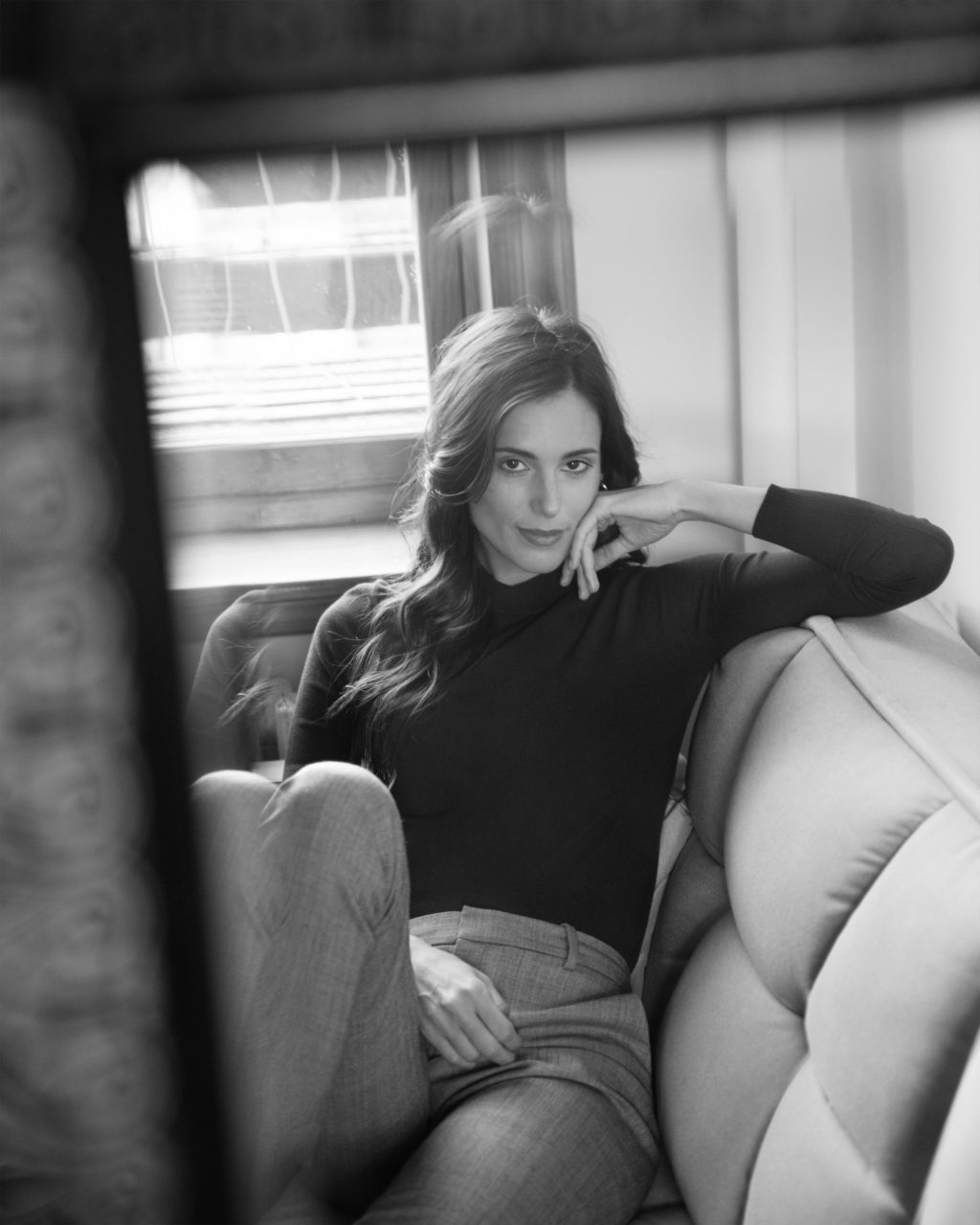
Liz wears the Zora top, the Mejia pants, and the Claressa earrings.
I FIND IT ALMOST IMPOSSIBLE TO SEPARATE MYSELF FROM MY WORK. Sometimes it happens when I’ve been in a deep meditation or had a really good therapy session, but for the most part, it’s very hard for me to disassociate from what I do, because it’s who I am. But I also feel like myself when I’m working. I’ve never tried to hide any parts of myself at work or put on a performance—which is good, because I’m a terrible actress. In that sense, I’m very lucky.
Want more M.M.? Sign up for our newsletter.
ONE OF MY GUIDING PRINCIPLES is to stay connected to my inner child. When I don’t listen to her, that’s when I’m the least happy. As a kid, I was very opinionated and strong in what I knew was right or wrong. I was raised in a household where empathy was important, and I just never got over the fact that the world is so unfair. My mom is a huge feminist, and also a survivor of incest. It was very formative for me to learn about the awful things that happened to the person I love most in the world, and it made me want to dedicate my life to trying to prevent those types of things from happening to other people. I wanted to create a different future for girls, and I’ve realized that a big part of that is helping and supporting boys and men. We don’t often think about how supporting boys actually helps us support girls and keep them safe.
A FEW YEARS AGO, I BECAME REALLY FRUSTRATED by the fact that I was going on MSNBC or CNN every single week to talk about the latest developments in the #MeToo movement and all the awful things that men have done to women. I got sick of all-female panels where I had to reiterate the same thing over and over again: why women were people. I kept getting asked, “Why would men do these terrible things?” And I was like, “I don’t know, maybe a man should be here. Maybe you should ask a guy. Why aren’t men answering these questions?” It seemed like women were expected to fix the problem that men were creating. Part of the equation wasn’t there.
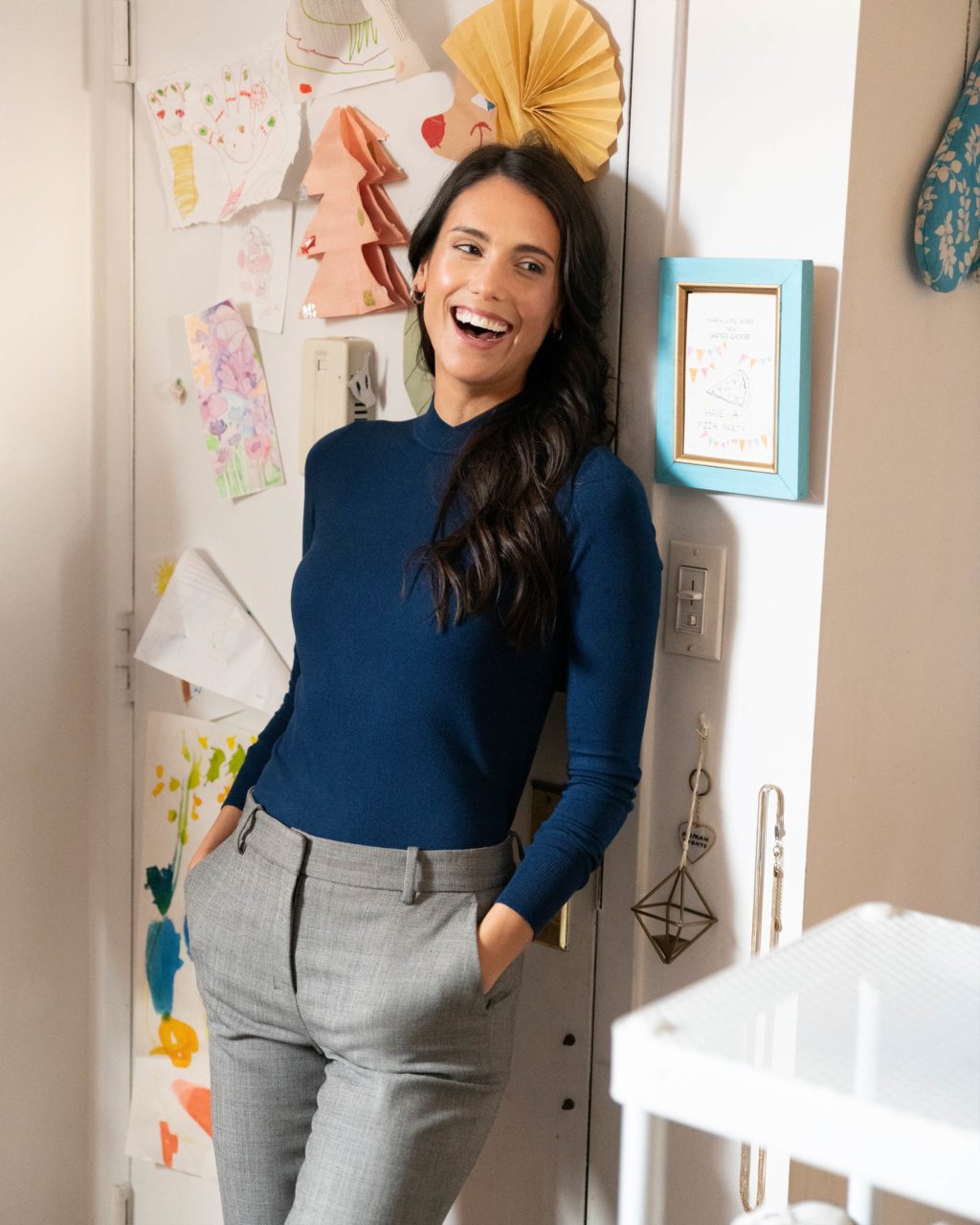
Liz wears the Zora top, the Mejia pants, and the Claressa earrings.
I UNDERSTAND THAT SOME WOMEN ARE UPSET that I’m talking about helping men when it’s women who bear the brunt of these problems. But at the same time, I think it’s very short-sighted to think that women wouldn’t be better off when the men in their lives are able to manage their emotions, can process their feelings, and are given permission to be full human beings in the world. I am convinced that we need a paradigm shift in the way that we talk about gender equality and that the conversation needs to involve men.
I GOT INTERESTED IN JOURNALISM when I was getting my master’s degree in London during the 2012 Olympics. I had taken up boxing at the time, and I noticed that female Olympic boxers were being forced to wear skirts while competing in the ring. So I started a petition to protest it. That was the first article that I ever wrote, and it went viral. There I was, at 25, seeing my name in the newspapers. The skirts rule was overturned, and that was my point of entry into the power of social media and seeing how I could impact these things I was passionate about. Journalism really chose me. I was a women’s studies major, and I was researching gender and social policy, but I didn’t know where that would lead me. When I started publishing articles and tying my knowledge of gender and feminism into current events, I realized that could be my full-time job.
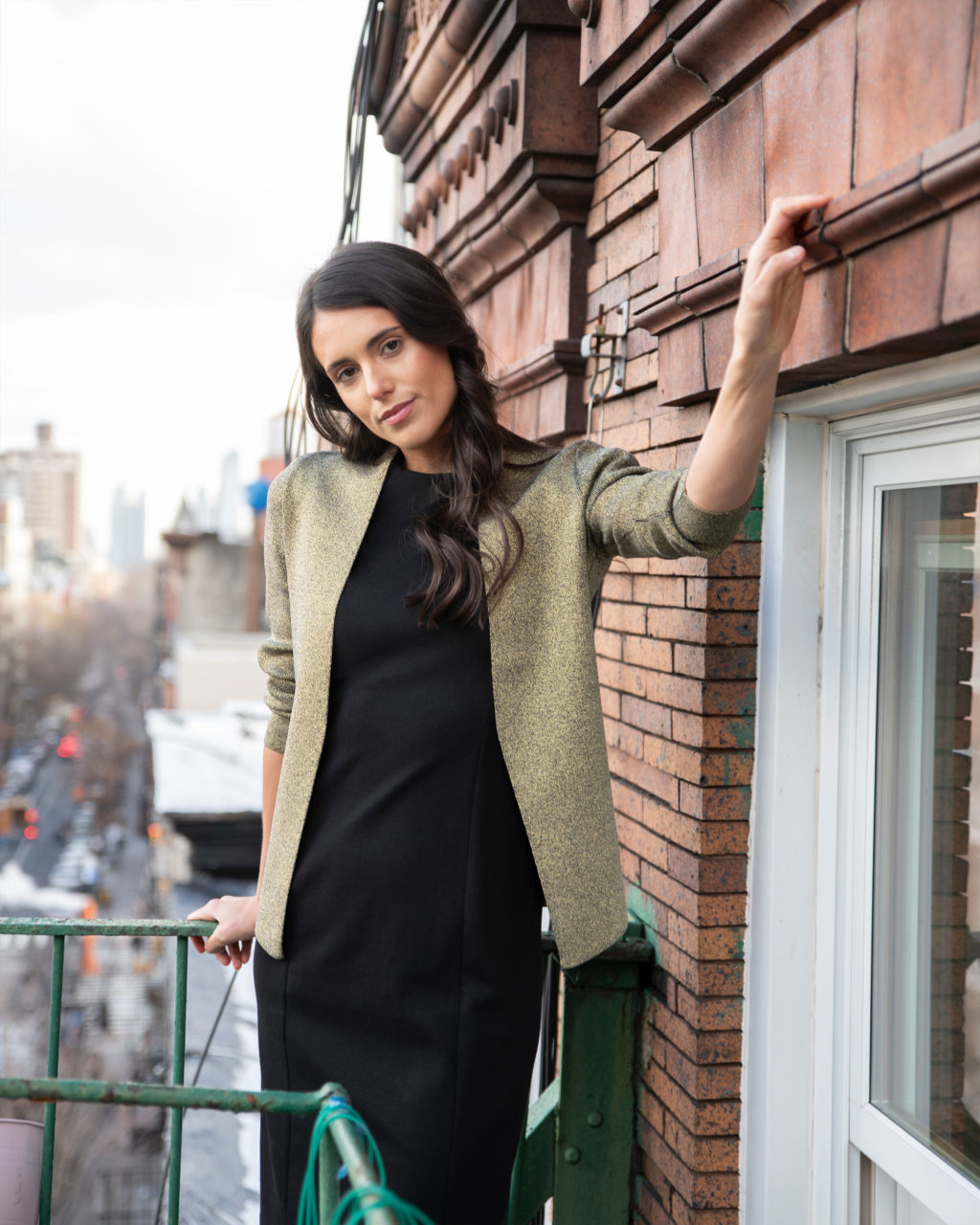
Liz wears the Greenlay dress and the Woolf jardigan.
THE FACT THAT I GET TO WORK IN NEW YORK MEDIA still baffles me. When I moved here, I got an internship at a start-up and worked my way up to senior writer. I started going on TV pretty early in my career—I think far too early, actually. I was a real wreck. The first time I went on air, I pretty much blacked out.
I TRY TO APPROACH THINGS WITH A BEGINNER’S MIND, and I think that’s helped me carve out a different space in video journalism. When I first started doing video, everything else was more serious and reporter-y, or fun comedy. We decided to embrace being a little bit of both, and we got a really positive reception and a lot of engagement. Then a lot of people started trying to copy us, and that’s the ultimate form of flattery.
OBVIOUSLY, I’M SENSITIVE TO PEOPLE’S OPINIONS. I care about how many likes a post is getting, and I hope that people like what I’m making. But my biggest goal is to have an impact. It goes back to that boxing petition—we helped create change. And I’m more focused on that than what are people going to think about me.
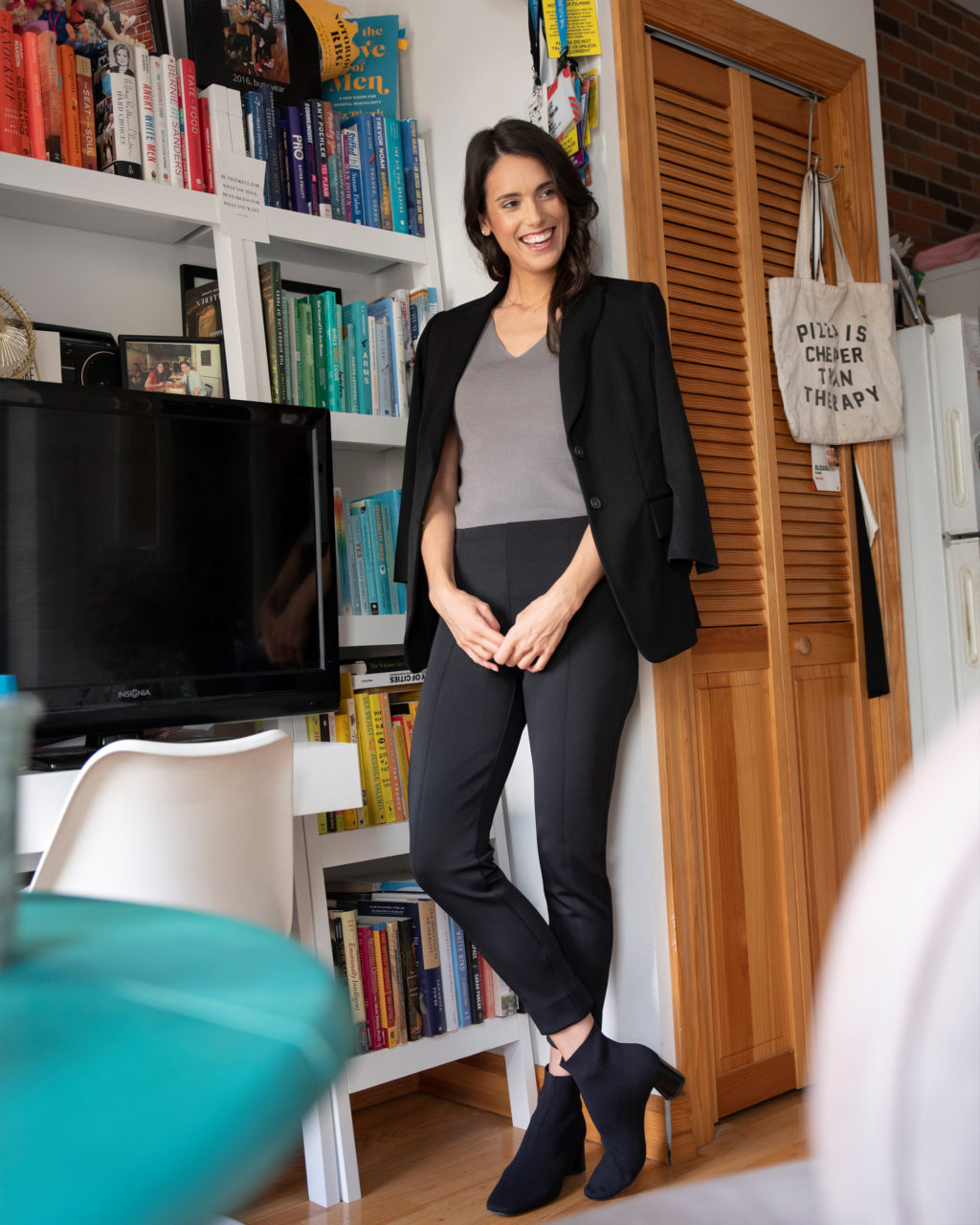
Liz wears the Peggy top, the Shaw pant, the Dietrich jacket, the Bezel earrings, and the Zelda boot.
I KNOW TONS OF PEOPLE DON’T LIKE ME. Tons of people want me to shut up, especially with this book. At one point, I was really anxious and starting to censor myself. I could tell that I was afraid to share my perspective because it was different from what people expected. I knew it was also going to make some people upset—people I really respected—and I made the decision to do it anyway. I have learned that the people-pleaser in all of us is usually not helpful in any way. I am still trying to unlearn those instincts. What helped me the most was to remain connected to the message. This book isn’t about me. It’s bigger than that. When I stay connected to something larger, that’s when I do my best work. I think that’s when everyone does their best work.
WE OVERCOMPLICATE THE PROCESS OF BEING TRUE TO OURSELVES. I’ve found that my body knows and my gut knows. I’ve never trusted my gut and then regretted it. It’s usually the opposite. When I have a tingly feeling about something or someone, and my body is sending me alarm bells, I try to listen to that indicator.
MY BOOK IS NOT ABOUT TELLING MEN HOW TO BE MEN. I’m not interested in doing that at all, even though lots of people think that I am. I keep reiterating that that’s nowhere in the book. Instead, it’s about having empathy for the process of becoming a man in our society. It’s about having compassion for how it can be an uphill battle to be a good person and a good man when you have to constantly prove that you’re a “real” man.
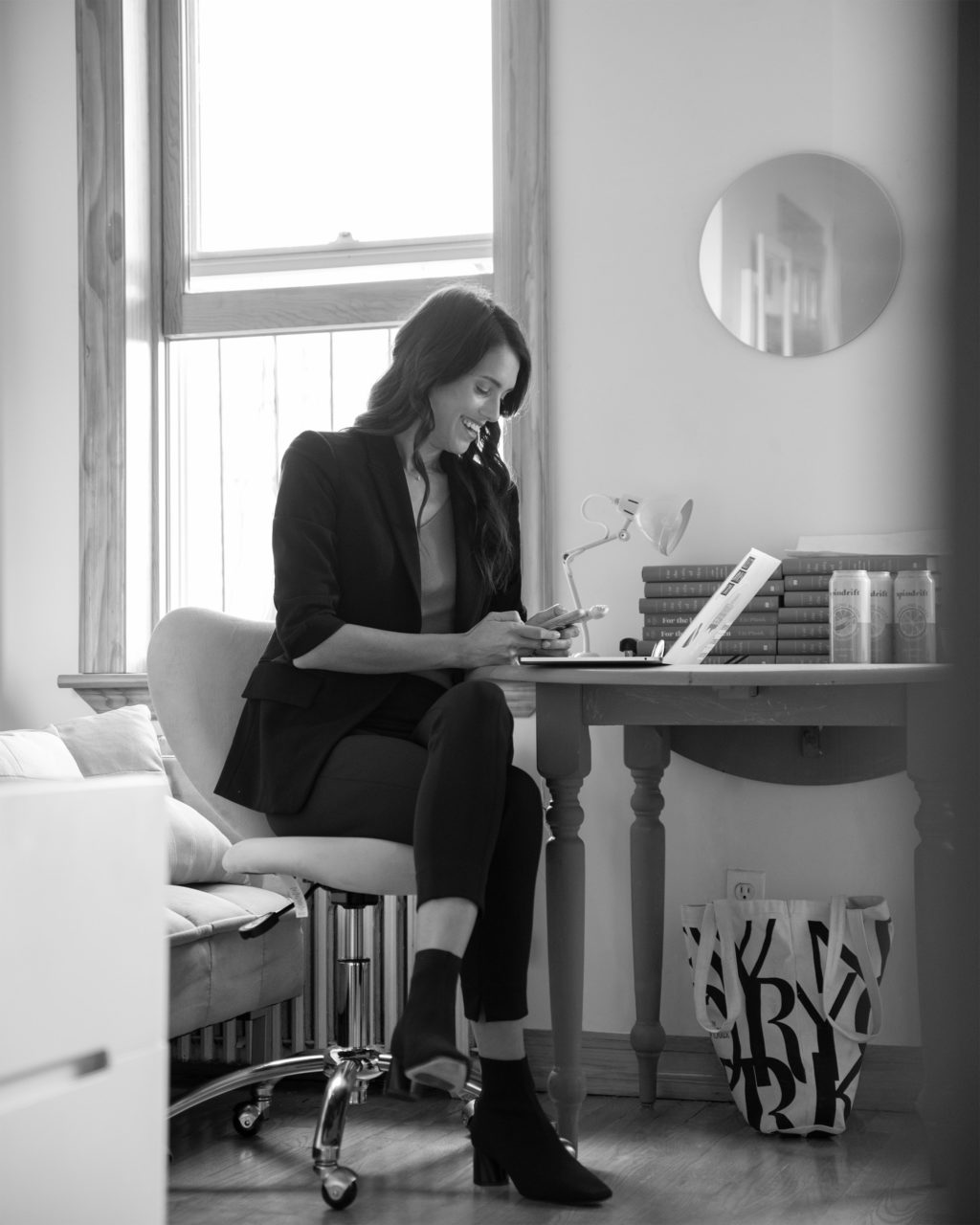
Liz wears the Peggy top, the Shaw pant, the Dietrich jacket, the Bezel earrings, and the Zelda boot.
I MANAGED TO WRITE A BOOK WITH A LOT OF COFFEE, constant anxiety, and no weekends off, which I would not recommend to anyone. I never want to do that again. I would get up really early every morning, try to write for two hours, and then go to work. I’m pretty foggy after about 3:00PM, so I try not to work in the evenings. I would just work out and go to bed really early. And then I would write all weekend. I wrote every day. I also had to put a lot of boundaries around myself and be clear with my friends and family about what I was available to do. I felt guilty the whole time, and I wish I felt less guilty. It was a pretty lonely experience.
I OFTEN GET OVERWHELMED WHEN I’M GETTING DRESSED. I hate that I have to think about what I’m wearing when I have so many other things to worry about. I’m very lucky to have a hair and makeup person when I’m on camera, and that’s immensely helpful. And the fact is, I do love expressing myself through my clothes. I’m not an all-black kind of person; I gravitate toward weird and colorful things that make a statement. I have a favorite coat right now that’s leopard. When I put it on, I feel like myself.
I’M AT MY WORST when I take myself too seriously and trying to play a part. Sometimes I need to dress a certain way because I’m going to an important meeting or I’m speaking somewhere, but even then I’ll put on a little unicorn pin or something. It’s a way to keep my inner child close to me. What would she want me to wear? It keeps me rooted in who I am.
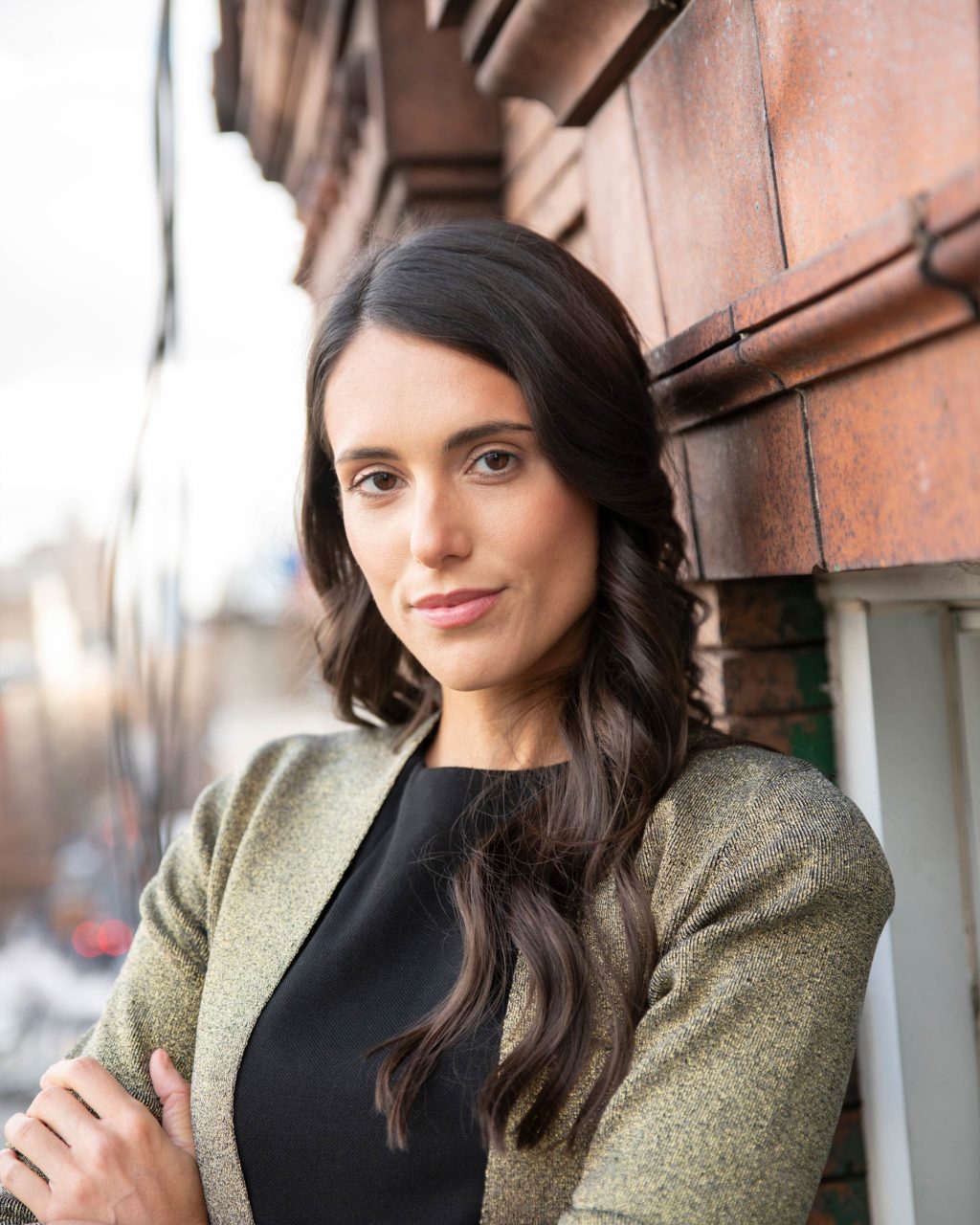
Liz wears the Greenlay dress and the Woolf jardigan.
I FEEL LOST IN MY CAREER EVERY DAY. I think it’s important to acknowledge that, and I don’t take any of it for granted. From the very moment that I moved to New York, I’ve known that I’m not entitled to this career, and it could go away tomorrow. Media and politics are very unstable places. The job that I’m doing didn’t exist when I was in high school. So maybe there’s another job that doesn’t exist yet that I’ll be doing ten years from now. I don’t know, but I think it’s important to let myself be a little bit lost so that I can explore.
WHEN I’M FEELING INSECURE, I try to go back in time and see the world through my eyes a year ago or ten years ago. Then I can look at everything I’ve done and think, “Wow, that’s amazing.” Some days when I walk into my office at Vox, for example, I’ll pretend it’s my first time there so that I stop and think, “Wow, I get to work here, that’s so cool.” I always suggest taking a photo of yourself on your first day of your job, and hanging it up somewhere so that you’re reminded of how far you’ve come. My other life hack is to remember to look up—literally. We’re all on our phones so much now that it’s easy to keep your head down all the time, and it makes you lose perspective. When I’m biking somewhere and I stop at a red light, I tilt my head back and look at the sky for a few moments. It helps keep me grounded.
Want to nominate a Woman of the Week? Email us at womanoftheweek@mmlafleur.com.
Photos by Matthew Priestley.
Styling by Nyjerah Cunningham, assisted by Ismelka Gomez.





